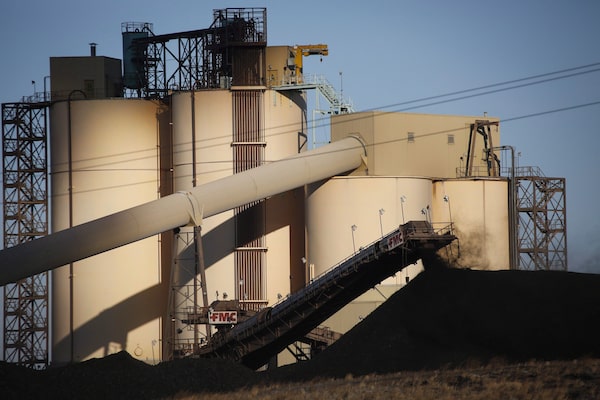
A conveyor belt transports coal at the Westmoreland Coal Company's Sheerness Mine near Hanna, Alta., in 2016.Jeff McIntosh/The Canadian Press
A committee tasked with reviewing Alberta’s coal-mining laws will now have until the end of the year to complete its work, after the Energy Minister granted it an extension Wednesday, citing a deluge of public feedback.
The provincial government struck the independent Coal Policy Committee in March to mollify public backlash against its decision to quietly kill a 44-year-old coal and land protection policy. The committee is preparing two reports – one detailing Albertans’ perspectives on coal development, the other providing recommendations for a modern coal policy.
That work was supposed to be completed and sent to Energy Minister Sonya Savage by Nov. 15. However, she said the group needs more time because of the volume, breadth and depth of input from Albertans.
Ms. Savage told The Globe and Mail that she wants to give the committee enough time to properly assess that feedback and develop its recommendations for the government’s next steps.
The committee has met with representatives from Indigenous communities and their organizations, municipalities, unions, coal companies and various other interest groups and non-profits. Interest was so great, it extended its public engagement period by two months – until the end of September.
It received more than 1,170 e-mailed submissions and detailed written responses and received materials from 67 engagement sessions.
Ms. Savage wasn’t surprised by the overwhelming response, saying coal “is an issue of the heart for Albertans.”
She said she knew the original mid-November deadline might be tough to meet, and in the end the sheer volume of information the committee received warranted the extension to Dec. 31.
Committee chair Ron Wallace said in a statement that shifting the deadline will allow the group to “better compile, assess and report on the extensive and insightful input submitted.”
“We are honoured to have been entrusted with this engagement and we reiterate our promise to ensure that the opinions about a modernized coal policy expressed by so many Albertans are accurately and proportionately reflected in our final reports to the Minister of Energy,” he said.
The committee and its work stem from the decision in May, 2020, to cancel a coal policy introduced in Alberta in 1976. Doing so made it easier for companies to pursue mines in sensitive regions, but widespread public anger forced the government to backpedal. It reinstated the policy, cancelled 11 coal leases and promised to consult with Albertans to come up with a new coal-mining plan.
Ms. Savage said a prohibition on coal activity or exploration will continue while the committee completes its report.
“Nothing can move forward with coal while we’re waiting for the report,” she said.
“It’s actually the professionalism of the people on the committee that they want to take the time and do it justice. And this is important. Albertans have said it’s important.”
Unlike the recent inquiry by Steve Allan into the funding of environmental groups opposed to the oil sands, which received multiple extensions and a million-dollar budget bump, Ms. Savage said the coal committee’s work will be within the budget already established by the government.
The coal committee’s extension comes on the heels of a new analysis by the University of Calgary’s School of Public Policy that concluded it’s simply not in the public interest to pursue coal mining on the Eastern Slopes of the Rocky Mountains.
The paper, co-authored by a group of five academics, was earlier submitted to the coal committee and released publicly on Wednesday morning.
The authors performed a cost-benefit analysis to compare the positives and negatives of a hypothetical coal mine in the eastern foothills. They found that a new mine would provide an economic benefit to Alberta of about $475-million in tax revenues and employment earnings. But that was overshadowed by the costs of displacing ranching and tourism and the negative environmental effects on water, vegetation, air and wildlife.
“Compounding these effects is the non-zero probability that the Alberta government will pick up the tab for reclamation costs, and the adverse social impacts on local communities and on Indigenous Peoples’ rights and interests,” the paper says.
“Therefore, any new coal mine development is unlikely to provide the province with a net benefit.”
The authors argue that the government should consider banning coal mining in the Eastern Slopes altogether and said any future coal development policy “should include a public-interest test that examines both monetary and non-monetary impacts.”
Ms. Savage said she will consider any suggestions the committee makes as a next step for the government.
Your time is valuable. Have the Top Business Headlines newsletter conveniently delivered to your inbox in the morning or evening. Sign up today.
 Emma Graney
Emma Graney